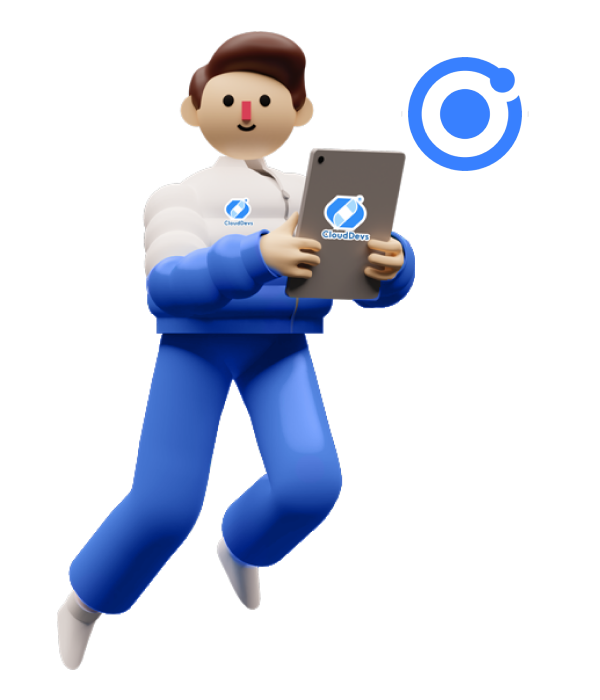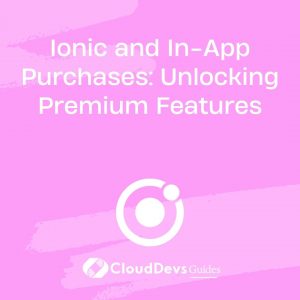Hire Senior Ionic Developers from Your Local Time Zone within 24 Hours
Access expert Ionic developers from our extensive talent pool of 8000+ pre-screened professionals located in Latam.
CloudDevs offers a complete hiring solution tailored for recruiting exceptional Ionic developers. Gain entry to a vast talent reservoir comprising of 8000+ rigorously evaluated senior experts.
Our platform guarantees effortless teamwork and specialized proficiency by granting you unique entry to top-tier Ionic developers residing in your specific local time zone. With CloudDevs as your partner, you can embark on creating resilient and expandable Ionic applications, capitalizing on the proficiencies and insights of our gifted Ionic developers.
With a 7 day risk free trial

Our Ionic Developers
Our top talents come from world leading companies
Adhemar
Senior Ionic Developer Ex-PayPal


Arildo
Senior Ionic Developer Ex-Bosch Engineering Latin America


Aaron
Senior Ionic Developer Ex-IntelliQuick Delivery and Logistics


Nélisson
Senior Ionic Developer Ex-SulAmérica


Kayo
Senior Ionic Developer Ex-GTPLAN Supply Chain 4.0


Gustavo
Senior Ionic Developer Ex-X Team


Murillo
Senior Ionic Developer Ex-Meta


João
Senior Ionic Developer Ex-MEDGRUPO




Melissa B
Founder


Jason Dong
Co-CEO, Founder

Anthony E
Co-Founder
How to Hire Ionic Developers
through CloudDevs?
3 easy steps to hire Ionic developers in 24 hours



1. What is Ionic?
Ionic is an open-source framework for building cross-platform mobile, web, and desktop applications using web technologies such as HTML, CSS, and JavaScript. It provides a set of tools and UI components that allow developers to create responsive and native-like user interfaces for various platforms, including iOS, Android, and the web.
Hence, Ionic uses a single codebase to target multiple platforms, which can save developers time and effort compared to building separate native applications for each platform. It uses Apache Cordova, also known as Capacitor, to enable access to native device features like camera, geolocation, and sensors.
Key features of Ionic
Ionic is a comprehensive framework that combines the benefits of web development with the capabilities of native applications, offering a variety of features and advantages:
-
Unified Codebase
One of the major advantages of Ionic is the ability to write code once and deploy it across multiple platforms. This means developers can create a single application that works on iOS, Android, and the web, reducing the need for platform-specific codebases.
-
User Interface Components
Ionic provides an extensive library of UI components, such as buttons, navigation bars, lists, and models. These components are styled to look and feel like native elements on each platform, giving users a consistent and intuitive experience.
-
Responsive Design
Ionic applications are inherently responsive, adapting to different screen sizes and orientations. This is crucial for delivering a seamless user experience on a variety of devices, from smartphones to tablets to desktops.
-
Performance Optimization
Ionic employs performance optimization techniques like Ahead-of-Time (AOT) compilation and lazy loading. This ensures that the application loads quickly and operates smoothly, even on devices with limited resources.
-
Native Features
Through integration with Apache Cordova (or Capacitor), developers can access native device features such as the camera, GPS, accelerometer, and more. This enables the creation of feature-rich applications that leverage the capabilities of the underlying hardware.
-
Angular and React Integration
Ionic offers support for popular JavaScript frameworks like Angular and React. This integration allows developers to leverage the tools, libraries, and patterns they’re already familiar with while building Ionic applications.
-
Plugins and Extensibility
Ionic provides a wide range of plugins that facilitate interaction with native device features. Developers can also create custom plugins to extend the functionality of their applications.
-
Customization and Theme-adding
The framework allows for easy theming and customization, enabling developers to adapt the app’s appearance to match their brand identity.
-
Rapid Development
Ionic’s pre-designed components and streamlined development workflow enable faster application development. This is particularly valuable for businesses seeking to release applications quickly.
-
Active Community and Documentation
Ionic boasts an active community of developers, designers, and contributors who provide assistance, share knowledge, and create resources. The framework’s documentation is extensive and comprehensive, aiding developers in learning and troubleshooting.
-
Cross-Platform Testing
Developers can use tools like Ionic DevApp to test their applications on real devices during the development process. This facilitates early testing and identification of potential issues.
Thus, Ionic revolutionizes app development by offering a versatile framework that bridges the gap between web and native development. With its ability to create cross-platform applications that are visually appealing, performant, and feature-rich, Ionic is an excellent choice for businesses and developers aiming to build applications for a wide range of platforms. Nevertheless, Ionic simplifies the process of creating cross-platform applications by leveraging web technologies and providing tools to streamline development and deployment.
2. Who is an Ionic developer?
An Ionic developer is a specialized software professional who is adept at creating applications using the Ionic framework. With a deep understanding of web technologies such as HTML, CSS, and JavaScript, an Ionic developer is skilled in crafting versatile cross-platform applications that seamlessly operate on mobile, web, and desktop environments. This role encompasses various responsibilities, including designing intuitive user interfaces through the utilization of Ionic’s rich array of pre-designed UI components.
An Ionic developer adeptly balances visual appeal and user-friendliness while customizing these components to align with the application’s unique design language. Ensuring impeccable platform compatibility across iOS, Android, and web browsers is another crucial aspect of their work, demanding careful optimization to guarantee responsiveness and a consistent user experience across a diverse range of devices. This professional integrates native device features into applications via Cordova plugins, enabling functionalities like camera access, geolocation, and push notifications.
Tasks of an Ionic Developer
An Ionic developer’s expertise extends to performance optimization, where they leverage techniques such as Ahead-of-Time (AOT) compilation, lazy loading, and code splitting to achieve swift loading times and seamless performance. Rigorous testing and debugging are integral to their process, encompassing meticulous examination across platforms and devices using tools like Ionic DevApp or emulators/simulators. Bridging the gap between frontend and backend, an Ionic developer skillfully connects application interfaces with backend services and APIs, proficiently handling data interactions and server communication. Collaboration and effective version control, often using Git, form an essential part of their workflow, ensuring efficient code management and teamwork.
Documentation is a critical aspect of an Ionic developer’s role, as they document code, project architecture, and implementation intricacies to facilitate understanding and maintenance by other team members. Remaining current with the latest features and updates within the Ionic framework and related technologies is paramount, enabling them to employ the most contemporary tools and best practices. The role requires adept problem-solving skills, as Ionic developers tackle challenges arising from cross-platform development complexities, nuanced device behaviors, and performance bottlenecks, demonstrating their resourcefulness in finding effective solutions.
3. What platforms are supported by Ionic?
While Ionic simplifies cross-platform development, it’s worth noting that certain adjustments might be required to tailor the user experience for each platform’s nuances. By employing tools such as Apache Cordova or Capacitor, Ionic developers can harness native device features and functionalities, elevating the capabilities of their applications across different platforms. Ultimately, Ionic’s broad spectrum of platform support empowers developers to create applications that reach diverse audiences and environments.
-
iOS: Ionic applications can be meticulously crafted to run natively on iOS devices, encompassing the entire spectrum of Apple products, from iPhones to iPads. These applications adhere to Apple’s design guidelines and can be distributed to users through the Apple App Store, providing a familiar and intuitive experience for iOS users.
-
Android: In addition to iOS, Ionic empowers developers to target the vast Android user base. Applications can be designed to function as native Android apps, ensuring compatibility with various smartphones and tablets. These apps can be made available to users via the Google Play Store, allowing them to seamlessly integrate with the Android ecosystem.
-
Web Browsers: One of the distinguishing features of Ionic is its ability to create applications that operate within web browsers. This means that the same application codebase can be accessed and used on desktop computers, laptops, and different devices that support web browsing. Ionic’s responsive design principles ensure that the user experience remains consistent across a range of screen sizes.
-
Progressive Web Apps (PWAs): Ionic takes advantage of the Progressive Web App (PWA) concept, which allows applications to be accessed through web browsers while delivering an experience akin to native apps. PWAs provide benefits like offline functionality, push notifications, and the ability to be installed on a user’s device, creating a seamless bridge between web and native apps.
-
Desktop: Leveraging the Electron framework, Ionic developers can transform their applications into native desktop apps. These apps can be tailored for Windows, macOS, and Linux platforms, expanding the reach of Ionic beyond traditional mobile and web environments.
-
Electron Apps: With Electron, the fusion of web technologies and native app development is possible. Ionic applications can be packaged as standalone desktop applications, providing users with a native-like experience while still leveraging the familiarity of web technologies.
-
Mobile Web: Alongside native iOS and Android apps, Ionic also facilitates the creation of mobile web applications. These applications are accessible through mobile web browsers and offer a responsive and functional experience on various devices, ensuring that users can interact with the app without the need for a separate installation.
-
Hybrid Apps: Ionic applications are often referred to as hybrid apps due to their unique blend of web technologies within a native app shell. This approach enables developers to reuse code and resources across platforms while tapping into the device’s native capabilities, thereby delivering a compelling cross-platform experience.
4. Can I use Ionic without a framework?
It is simply a yes or no question, and the answer is yes. You can use Ionic without a Framework. This is done by loading the Ionic web components through a simple script tag, or you can also use a Capacitor to build your software. Thus, it has to be noted that the main reason why web components for Ionic were introduced was because it was aimed to remove any hard requirements for a single framework to host the components.
Alternatives for Ionic Framework are;
-
React Native
-
Flutter
-
Cordova
-
Xamarin
-
Swift
-
Android Studio
-
NativeScript
-
Unity
-
Apache Flex
-
PhoneGap
5. What are the benefits of Ionic?
Ionic is an open-source framework that offers a plethora of benefits for developers aiming to create cross-platform mobile and web applications using familiar web technologies such as HTML, CSS, and JavaScript. Hence, one of the primary advantages lies in its cross-platform development capabilities, allowing developers to create applications for different platforms such as Android, iOS, and the web (all from a single shared codebase). Furthermore, this approach significantly reduces development time and effort, making it an attractive option for projects targeting multiple platforms. It has become important to know that Ionic boasts a library of pre-designed UI components that closely resemble native app elements, contributing to a professional user interface that remains consistent across platforms.
Moreover, the framework strikes a balance between performance and versatility. While not as fast as fully native apps, Ionic applications still deliver respectable performance due to the inherent optimizations of the framework and the utilization of web technologies. This enables developers to create responsive and functional apps without compromising loading speed.
One other major benefit of Ionic is its vibrant open-source community that surrounds the Ionic framework. This community actively contributes to the ecosystem by providing plugins, extensions, and solutions to common challenges, ensuring that developers have access to a wealth of resources and assistance as they work on their projects. The collaborative nature of the community can significantly expedite the development process and provide solutions to potential roadblocks.
Ionic facilitates rapid development, particularly for web developers who are already familiar with web technologies. The framework’s simplicity and alignment with web development practices make it relatively quick to learn and deploy, allowing developers to start building applications sooner. Furthermore, Ionic apps can access native device features such as the camera, GPS, and sensors through integration with platforms like Cordova or Capacitor, enhancing the user experience by providing seamless access to device capabilities.
6. Can Ionic be used for web development?
While Ionic initially gained popularity as a framework for building cross-platform mobile and desktop applications, it has evolved to offer web development capabilities as well.
It is possible to use Ionic to create web applications using the same set of web technologies such as HTML, CSS, and JavaScript, and UI components that are available for building mobile apps. This means you can develop both mobile and web applications using a single codebase, which can be a significant advantage in terms of development efficiency and code maintenance. Keep in mind that while Ionic is suitable for web development, it may have some features or optimizations that are more tailored to mobile app development.
7. How much does it cost to hire Ionic Developers?
If you are looking to hire a freelance Ionic developer, then the cost of hiring one can vary widely based on factors such as their experience, location, skillset, and the complexity of the project. Some of the factors that impact the price of hiring an Ionic developer include;
-
Experience: Developers with more experience in the Ionic framework and related technologies may command higher rates due to their expertise and ability to handle complex tasks.
-
Location: Developer rates can vary significantly depending on their location. Rates tend to be higher in regions with a higher cost of living, such as North America and Western Europe, compared to regions with a lower cost of living, like Southeast Asia or Eastern Europe.
-
Skillset: The developer’s overall skillset, including proficiency in related technologies like Angular or React, can influence their rates.
-
Project Complexity: The complexity of your project, including the number of features, integrations, and customizations required, will affect the time and effort a developer needs to put in, thus impacting the cost.
Sample estimate for the price of hiring freelance developers:
-
Junior Developer: $20 to $50 per hour
-
Mid-Level Developer: $50 to $100 per hour
-
Senior Developer: $100 to $150+ per hour
At CloudDevs, it usually takes around 35 dollars to 70 dollars per hour to hire a dedicated Ionic developer from Latin America, from your time zone. We also offer the chance for pay-as-you-go, which allows you to roll weekly contracts with no minimum commitment when you hire our developers from Latin America. One of the best advantages of hiring Ionic developers through CloudDevs is that we offer a seven-day free trial period, and if you are not satisfied with the developer you hire, you can always hire another developer, or have a refund.
8. What is the role of an Ionic developer?
-
Application Development
Ionic developers are responsible for writing the code that makes up the application. This includes creating the user interface by writing HTML to structure the content, CSS to style the components, and JavaScript to add interactivity and functionality to the app.
-
Framework Proficiency
A proficient Ionic developer understands the ins and outs of the Ionic framework. They know how to use Ionic’s pre-built UI components, services, and modules to build various parts of the app.
-
Integration with Web Frameworks
Since Ionic often works alongside web frameworks like Angular or React, the developer must be skilled at integrating these frameworks. This involves setting up routing, managing data flow, and leveraging the strengths of both technologies to create dynamic applications.
-
UI/UX Design
While Ionic provides UI components, an Ionic developer needs to go beyond basic implementation. They should have an eye for design to ensure the app’s interface is visually appealing and follows good user experience principles.
-
Cross-Platform Development
Ionic developers should understand the differences between various platforms such as iOS, Android, and the web and write code that adapts to these differences. They use platform-specific features when necessary and ensure a consistent experience across all platforms.
-
Native Feature Integration
Ionic apps can access native device capabilities using plugins. Developers need to know how to integrate these plugins to utilize features like accessing the camera, using GPS, sending notifications, and more.
-
Testing and Debugging
Rigorous testing is essential to identify and fix bugs and ensure the app functions as expected. Ionic developers need to conduct testing across platforms and browsers, using tools for debugging and identifying issues.
-
Performance Optimization
Ionic developers optimize app performance by following best practices such as lazy loading, which loads only the necessary parts of the app when needed, and minimizing the app’s memory and CPU usage.
-
Code Maintenance
After the initial development, Ionic developers continue to work on the app by adding new features, fixing bugs, and addressing updates to the framework or related technologies. Regular maintenance ensures the app remains up-to-date and functional.
-
Collaboration
Collaboration is key in software development. Ionic developers work with designers to bring visual designs to life, with backend developers to integrate with server-side functionalities, and with other team members to ensure smooth project progress.
-
Version Control
Proficiency in version control tools like Git allows Ionic developers to manage changes to the codebase, collaborate with team members effectively, and roll back to previous versions if needed.
-
Staying Updated
The tech landscape evolves rapidly, and Ionic developers need to stay updated with the latest developments in Ionic framework, web technologies, and industry best practices. This continuous learning ensures they’re equipped to build modern and efficient applications.
Accordingly, an Ionic developer is a versatile professional who combines technical expertise in web technologies and the Ionic framework with design sensibilities, problem-solving skills, and collaboration abilities to create cross-platform applications that deliver a high-quality user experience.
9. How to hire an Ionic developer?
If you are looking to hire an Ionic developer, start by defining your project requirements and budget. You can search on platforms like LinkedIn, review portfolios, and assess their experience and skills in the Ionic framework. You can also check references, evaluate communication skills and time zone compatibility, and negotiate terms. Consider a trial project to assess compatibility, ensure a cultural fit, and establish communication channels. Provide regular feedback, and upon project completion, make final payments. It is quite important to prioritize both technical proficiency and alignment with your project’s needs for a successful collaboration.
If you are looking for the best-talented developers from Latin America, look no further than CloudDevs. At CloudDevs, our talent pool of over 8000+ developers is pre-vetted and is amongst the best talents in South America. Hence, as mentioned above, CloudDevs provides a 7-day no-risk trial period, which means if you are not happy, then we will replace the developer or refund the money. The clients can also cancel the project whenever they want.
Table of Contents
Ionic FAQs
Ionic is an open-source framework for building cross-platform mobile applications using web technologies such as HTML, CSS, and JavaScript. It provides a set of pre-designed UI components and tools that enable developers to create visually appealing and interactive mobile apps that can run on both iOS and Android platforms. Ionic leverages web development skills to streamline the mobile app development process, making it easier to build and deploy apps across different devices and operating systems.
Similar to the requirements checked when hiring an Ionic developer, the same set of skills are required to become an Ionic developer.
Technical skills:
- Proficiency in web technologies such as HTML, CSS, and JavaScript
- Professional expertise in the Ionic framework, including frameworks like Angular and React
Soft skills:
- Problem-solving skills
- Effective communication
- Time Management
- Decision making
If you are looking for the best remote Ionic developers, then CloudDevs is the place for you. We are an online platform with a pool of developers who have got together and collaborated as a team to provide services in three models, as freelancers, for direct recruitment, and team augmentation. We have mentioned our specialties including our budget-friendly hiring process, and pre-vetted developer pool, in detail throughout this article.
All developers at CloudDevs have undergone the three-step vetting process, which is to ensure that we provide a quality service to our clients. First, we conduct a communication and personality check through a video call to check the candidate’s personality and English language communication skills. In the second step, technical skills are evaluated and this is conducted based on the candidates’ specific field and expertise. The final step is a live coding challenge. This is to ensure the candidate’s capability to perform under pressure and to deliver high-quality code within the time restrictions available.
Hire Highly Skilled Ionic Developers Today!
Outline your needs and be swiftly connected with a senior Ionic developer from our elite talent pool of 8000+ experts within less than 24 hours.














